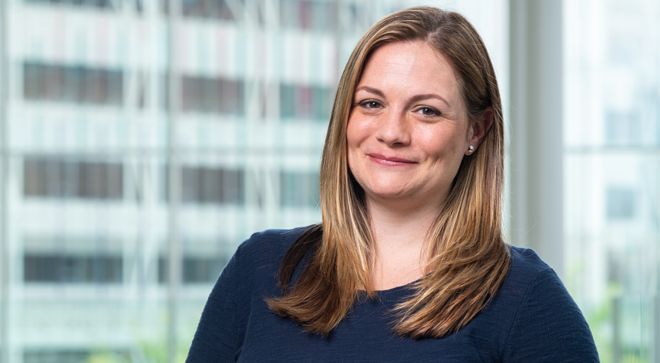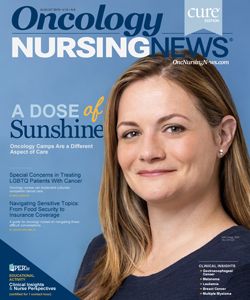A Dose of Sunshine: Nurses Who Volunteer at Oncology Camps for Kids Learn a Different Aspect of Care
Camps for patients and their families bring happiness both to the campers who attend and the nurses who work there.

Kelly Clegg, BSN, RN, CPHON - Photo credit: Kyle Kielinski
It’s a beautiful day at Happiness Is Camping (HIC), a free residential summer camp for children with cancer and their siblings, held in Hardwick, New Jersey. Children are laughing as they splash in the swimming pool, and a rousing game of beach volleyball is being played nearby.
Laura San Miguel, RN, PNP, who serves as the camp’s full-time summer nurse, smiles watching the campers play. She remembers a comment made by the camp’s longest non-nursing volunteer, a parent who lost a child to neuroblastoma and has battled stage IV breast cancer herself and who commutes from Florida each summer to volunteer. The mother put it best when she said, “Walt Disney was wrong, this is the happiest place on Earth,” San Miguel said.
Sleepaway camps, such as HIC, are held across the country throughout the year, offering pediatric patients and their siblings a chance to enjoy recreational opportunities, make new friends, and take a respite from hospitals and medical tests.
Although camp is a memorable rite of passage for all children, it represents unprecedented freedom for children and teens with cancer who have spent much of their lives undergoing medical treatments. Staffed by oncology nurses and other medical professionals in both paid and unpaid positions, the children who attend can have both a safe and memorable experience.
San Miguel first learned about HIC in 1995 while working as a staff nurse in pediatric oncology at Memorial Sloan Kettering Cancer Center in New York. She heard the camp was seeking volunteer medical personnel and decided to apply, and she has been volunteering at the camp ever since.
“HIC is a life-changing experience. The kids are amazing, and the gift of seeing the campers’ resilience and joy, their camaraderie and support, is priceless,” San Miguel says. “When I first started volunteering at camp, the nursing director told me I would get far more out of it than I ever put in, and she was right.”
Childhood cancer can be an isolating experience, but through recreation and other activities, these young campers are given the chance to gain independence, expand their horizons, and improve their self-confidence.
At HIC, the campers range in age from 6 to 15 years, and their siblings are invited to accompany them. Last year, San Miguel says the camp created a leadership program for 16- and 17-yearolds that runs over the course of 3 sessions.
“There was a 2017 study conducted by the University of Illinois that found adult survivors of pediatric cancer are 5 times less likely than their peers without cancer to get a job and 15 times less likely to go to college than their own siblings,” San Miguel says. “We created this program to combat these statistics and to teach life and communication skills, leadership training, and also science, technology, engineering, and math [STEM] workshops.”
San Miguel says children with cancer get so much out of the camps. She remembers meeting Adam, age 12, during her first summer as the full-time camp nurse.
“It was the first time he was going to be away from his family since his diagnosis,” San Miguel says. “He was nervous, and the high-dose steroids didn’t help. He was really homesick, but with our support, [he] talked himself through those first few days and had an amazing week. When his mom came to get him that Friday, she looked me in the eyes and said, ‘That was exactly what we all needed.’”
San Miguel says that experience showed her how camp also allows parents and caretakers time to reconnect while knowing their children are in a safe and supported environment.
“Adam came back every summer until he graduated into counselor age, and this will be his second summer as a counselor at HIC,” San Miguel says. “Camp is an amazing opportunity for the volunteer nurses (and doctors) to see our population out of a clinical setting. The experience has definitely made me both a better nurse and a better person.”
SUPPORTING YOUNG PATIENTS WITH CANCER
For nurses, summer camp provides the opportunity to see these children in a different light.
“At camp, we’re able to connect with the kids on a different level than in the hospital setting,” says Kelly Clegg, BSN, RN, CPHON, clinical supervisor, radiation oncology, Perelman Center for Advanced Medicine at The Children’s Hospital of Philadelphia (CHOP) in Pennsylvania. Clegg is celebrating her fifth summer working at Ronald McDonald Camp, located 3 hours from Philadelphia, in the Pocono Mountains. “I leave the camp each year feeling rejuvenated.”
“CHOP pays for oncology nurses and doctors to donate a week of their time to working at the camp every 2 years,” Clegg explains. “It’s considered a privilege to work at the camp.”
Clegg says nurses care for simple medical problems including bruises and scrapes and also oversee children who are using urinary catheters or feeding tubes or are on oral chemotherapy. Each year, Clegg says 7 nurses and 1 nurse practitioner staff the camp. Nurse volunteers should have oncology experience, the ability to provide routine and emergency care to campers, and a high degree of patience and stamina.
“Children must be in stable condition to attend camp,” Clegg explains. “We have some campers who are in remission that we’ve been treating since they were children, and now they’re attending camp as teens.”
Clegg says some campers have also received a terminal diagnosis and camp symbolizes their chance to take part in many activities their healthy peers have taken for granted.
“For 1 week, they’re just kids, not [patients with] cancer,” Clegg says. “Our staff will go that extra mile to help them enjoy activities they may have thought they could never do.”
Golf carts and wheelchairs are often used at cancer camps to ensure children can easily navigate the area, and activities such as zip lining, swimming, and canoeing are modified to ensure all campers can participate. Clegg says staff often improvise in order to help campers make the most of their experience.
“We have assistive devices for children who may be in a wheelchair or have difficulty walking to safely enjoy the zip line,” Clegg says. “There was 1 patient who couldn’t run and always wanted to fly a kite, so we put her in the back of a golf cart with her kite high in the air so she could finally have the experience.”
Since the camp also invites siblings to attend, Clegg says it serves as a loosely based support group where campers can meet other children and families who have undergone similar experiences. Nurses are also encouraged to participate in the wide array of camp activities. Clegg admits she’s ridden the zip line at camp as well as arts and crafts and canoeing.
“Working at camp is an experience that definitely puts you out of your comfort zone,” Clegg admits. “And the rewards nurses receive in return are 10-fold.”
GIVING A NEW MEANING TO NURSING
Morgan Smizer, BSN, first learned about Camp Quality in Wichita, Kansas, while working in the Pediatric Unit at Wesley Medical Center in Wichita. After picking up a brochure on the camp, she called to volunteer and has now been working there for 3 years, the past 2 as the camp’s medical director. Smizer recruits 6 volunteer nurses each year to help throughout the week. Since some nurses don’t have the availability to be present for the entire week, she makes a staggered schedule that works for everyone.
“Our nurses are present for every activity, every meal, and all of the things that happen during the course of the day,” Smizer says. “I do a thorough history and medication assessment from each camper’s personal profile prior, and then we all collectively arrange and organize all the medications for the week, scheduling them to be given in the morning, and at breakfast, lunch, dinner, and bedtime.”
Although Smizer works in a pediatric intensive care unit, where she sees a lot of oncology patients, she says caring for them at camp is very different.
“I get such joy out of seeing these kids outside of the hospital setting, not connected to any tubes, wires, or hoses, and just being able to be kids,” she says. “I love the bonds they form with me, the other kids, and volunteers at the camp. This camp gives a whole new meaning to nursing.” Smizer says campers are also appreciative of the camp experience and that nurses consistently receive positive feedback.
“Most of the campers say this is the 1 thing they look forward to most every year, more than Christmas, more than their birthday, more than anything,” Smizer says. “They get to see old friends from years past, make new friends, participate in endless activities, and be reminded they are kids who aren’t defined by cancer.”

Innovative Program Reduces Nurse Turnover and Fosters Development
Published: September 12th 2024 | Updated: September 12th 2024The US Oncology Network (The Network) has developed one of the most comprehensive programs in the nation to support the professional development and retention of new oncology nurses.


